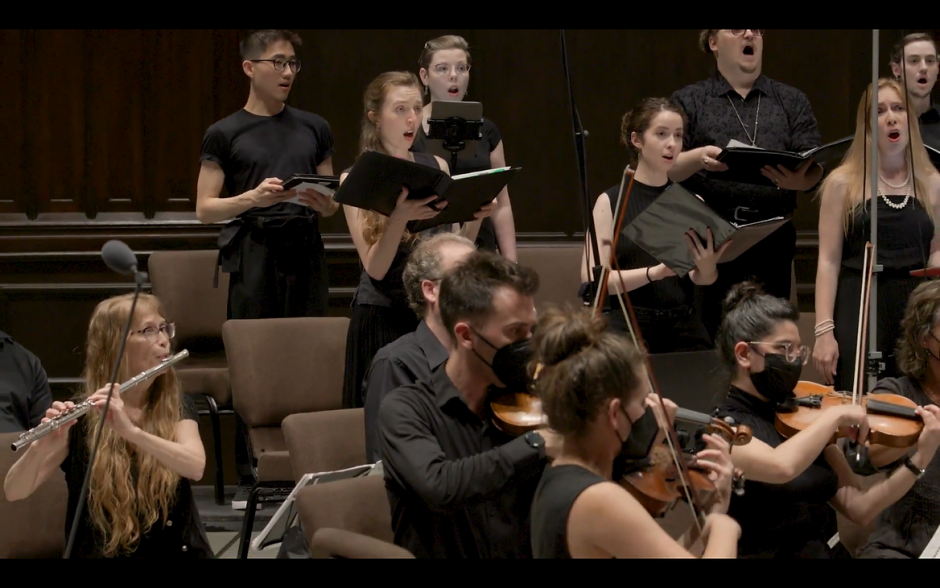A Contemplative Pedagogy of Listening
Resounding Ecojustice
An oratorio by Linda J. Chase
Libretto adapted from Pope Francis’ 2015 encyclical, Laudato Si’
For Our Common Home – Resounding Ecojustice lifts up humanity’s urgent need to heal our relationship with Earth and each other. This new cross-genre oratorio for choir, soloists and chamber orchestra, is based on Laudato Si’ an encyclical issued by Pope Francis calling on humanity to acknowledge the urgency of the environmental crisis and work toward building a just and sustainable world. Inspired by a canticle of St. Francis of Assisi, the message focuses on environmental justice, addressing the impact of climate change on the most vulnerable communities. The choral arrangements are complemented with jazz, gospel, and klezmer styles.

References to Earth crying out not only to calls attention to the devastation wrought by climate change but also endangered species of animals, racism, violence against women, governmental systems of oppression, and climate refugees on perilous journeys. It is no accident that the piece’s genesis during COVID corresponds to a time when people came together to demand that “injustice be defeated in the land” with protests accelerating around the world with the Movement for Black Lives. This piece is an effective musical parallel with poetic text portraying God as a “God of liberation” and inviting us (as does St. Francis) to see nature as a magnificent book and, above all, asking humanity to “harmonize with creation.”
Movement 2: We Come Together
Soloist: Burcu Gulec
We come together to care for our home.
We’ve been entrusted to heal and recover.
Journey together in union with all creatures.
Movement 5: Languages of Trees
Read the pages, God is speaking
Creator speaks in languages of trees
Hear the singing of divinity
The flowers sing of beauty
Read the pages, God is speaking
Creator speaks in languages of trees
The book in which God speaks
Creator writes on pages in the sky and in the sea
Read the pages, God is speaking
The worlds’ a joyful mystery
Nature is singing
The book in which God speaks
Languages of trees
Movement 8: Sister Cries Out
Vocal soloists: Carla Kihlstedt and Sara Bernadette
Soprano saxophone: Stan Strickland
Sister cries out, she has been misused.
Sister cries out, she has been abused.
Destruction, devastation, deforestation
Pollution, production, injustice, corruption
Extinction, rebellion, radiation, desecration
Industry fumes, burning fossil fuels
Pipelines leak, water we can’t drink
Species go extinct
Rhino, cheetah, macaw, whooping crane
Wild fires burn, Ice does not return
Butterfly, penguin, monk seal, dolphin
Pesticides kill bees, plastic in the sea
Drilling, spilling oil, cutting, clearing trees
Sister cries out, sister cries out
Movement 9: We Are Not God
The earth was here before us
A gift for us to keep
To share the fruit with those in need
Protect and oversee
Unjustified dominion destroys the bond we seek
Respect the laws of nature take only what you need
Caring and preserving all beings are our kin
Relationship not conquest with shared inheritance
We are not God
Movement 16: We Are Dust
Vocal soloists: Jadon Brooks and Burcu Gulec
Violin solo: Abigale Reisman
Breathe in the sky, sunlight caressing
We are dust of the earth
Seedlings are reaching, nourishing being
We are dust of the earth.
We are dust, we’ve forgotten
We are dust of the earth.
We are not the masters
Earth cries out can you hear her?
We are only dust of the earth.
Movement 18: What Does Earth Need?
Soloists: Stan Strickland & Carla Kihlstedt
What kind of world will we leave?
What is the purpose of our labor and our being?
What is our meaning?
And what does Earth need?
What does it mean to be free?
And when the laws protect the profits not community?
And is it freedom when it leads to suffering?
Because all are not free
Movement 24: Let Us Sing As We Go
Soloist: Sarah Brindell
May our struggles and concern for our planet never take away the joy of our hope
Journey together, we are entrusted, God the creator offers strength and light we need
To continue in the heart of the world, God’s love is always near.
Let us sing as we go!
Linda J. Chase, composer/flutist
Boston based composer/flutist Linda J. Chase is a member of the composer’s network Landscape Music and has received composition awards from the Japan Foundation, Grand Canyon National Park, Kaji Aso, Juventas New Music Ensemble, Berklee College of Music and the Morris Graves Institute. With poet Jane Hirshfield she collaboratively created and performed Hope is the Hardest Love We Carry.
From a review of her first oratorio, The City is Burning: “Chase’s iconoclastic genre-crossing oratorio proceeds from dark to light, and wins its struggle for transcendence…she displays the gift of melody, something that listeners feel lucky to encounter, something that lives in the bones long after the music itself has died away.” (the arts fuse, 2017)
My music spans diverse styles drawing also from poetry or reflections from nature and is often based on themes of peace and justice. I write chamber music, jazz, choral, vocal, instrumental, and conceptually based pieces. I’m interested in how the creative process can blend the boundaries between improvisation and composition while paying attention to color and relationships between sound and silence.